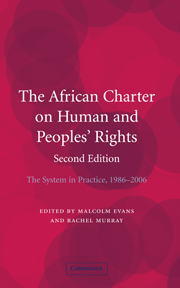Book contents
- Frontmatter
- Contents
- List of contributors
- Table of cases
- List of abbreviations
- Editors' Preface
- Introductory Preface: The African Charter and African Commission on Human and Peoples' Rights
- 1 The African Union and the Regional Human Rights System
- 2 The State Reporting Mechanism of the African Charter
- 3 Communications under the African Charter: Procedure and Admissibility
- 4 Evidence and Fact-Finding by the African Commission
- 5 Civil and Political Rights in the African Charter on Human and Peoples' Rights: Articles 1–7
- 6 Civil and Political Rights in the African Charter: Articles 8–14
- 7 Group Rights
- 8 The Role of Non-governmental Organisations and National Human Rights Institutions at the African Commission
- 9 A View from the Inside: The Role of the Secretariat
- 10 The Special Rapporteurs in the African System
- 11 Working Groups of the African Commission and their Role in the Development of the African Charter on Human and Peoples' Rights
- 12 The Creation of a New African Court of Justice and Human Rights
- 13 Protocol to the African Charter on the Rights of Women in Africa
- Bibliography
- Index
6 - Civil and Political Rights in the African Charter: Articles 8–14
Published online by Cambridge University Press: 01 July 2009
- Frontmatter
- Contents
- List of contributors
- Table of cases
- List of abbreviations
- Editors' Preface
- Introductory Preface: The African Charter and African Commission on Human and Peoples' Rights
- 1 The African Union and the Regional Human Rights System
- 2 The State Reporting Mechanism of the African Charter
- 3 Communications under the African Charter: Procedure and Admissibility
- 4 Evidence and Fact-Finding by the African Commission
- 5 Civil and Political Rights in the African Charter on Human and Peoples' Rights: Articles 1–7
- 6 Civil and Political Rights in the African Charter: Articles 8–14
- 7 Group Rights
- 8 The Role of Non-governmental Organisations and National Human Rights Institutions at the African Commission
- 9 A View from the Inside: The Role of the Secretariat
- 10 The Special Rapporteurs in the African System
- 11 Working Groups of the African Commission and their Role in the Development of the African Charter on Human and Peoples' Rights
- 12 The Creation of a New African Court of Justice and Human Rights
- 13 Protocol to the African Charter on the Rights of Women in Africa
- Bibliography
- Index
Summary
Introduction
Nearly twenty years ago, on 21 October 1986, the African Charter on Human and Peoples' Rights (‘African Charter’ or ‘the Charter’) came into force, having been ratified by twenty-six Member States of the then Organization of African Unity (OAU), now the African Union (AU). With the adoption of the Charter five years earlier, on 27 June 1981, Africa became the third region to have its own human rights convention, after Europe and the Americas. However, the Charter introduced striking innovations by the normal canons of international human rights law – entrenching the concept of ‘peoples’ rights, in addition to civil and political rights and economic, social and cultural rights – all in one single document. Like any other human rights treaty, the African Charter imposes an obligation on States Parties to take specific legal and other measures to give effect to the rights and freedoms it guarantees, and to provide effective remedies in case of violations. It is the primary responsibility of each State Party to implement the Charter in its domestic laws, but the Charter also establishes an implementing mechanism, the African Commission on Human and Peoples' Rights (‘African Commission’ or ‘the Commission’) to monitor the extent to which States Parties are complying with their treaty obligations.
- Type
- Chapter
- Information
- The African Charter on Human and Peoples' RightsThe System in Practice 1986–2006, pp. 213 - 243Publisher: Cambridge University PressPrint publication year: 2008



